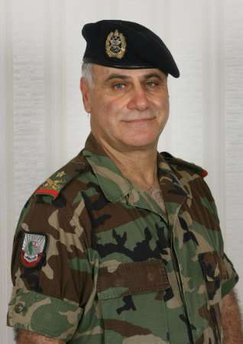 The new chief of the Lebanese army, Jean Kahwaji, has been promoted to general in a ceremony attended by his predecessor, President Michel Suleiman. Gen Kahwaji was appointed to the post at a meeting of the national unity government on Friday evening. The 54-year-old Maronite Christian had been a brigade commander since 2002. Many Lebanese regard the army as one of the country’s few neutral institutions, and say it plays an important role in preventing sectarian conflict.
The new chief of the Lebanese army, Jean Kahwaji, has been promoted to general in a ceremony attended by his predecessor, President Michel Suleiman. Gen Kahwaji was appointed to the post at a meeting of the national unity government on Friday evening. The 54-year-old Maronite Christian had been a brigade commander since 2002. Many Lebanese regard the army as one of the country’s few neutral institutions, and say it plays an important role in preventing sectarian conflict.
"The Council of Ministers decided to appoint General Jean Kahwaji to the post of chief of the Lebanese army," Mitri told reporters at the end of a cabinet meeting at the presidential palace. Kahwaji, 54, joined the army in 1973. He has undergone specialised military training abroad, including in the United States and Italy, while in 2006 he went to Germany for intensive anti-terrorism training. Decorated on several occasions, he has occupied the post of commander of the second infantry division since 2002. He is married with three children. General Shawki al-Masri, the army’s chief of staff, had been acting as head of the army since Sleiman was elected president of Lebanon on May 25, ending a drawn-out political crisis in the country. Observers say the 60,000-strong majority Shiite Lebanese army is these days more of a peacekeeping unit than an offensive force. At the end of 2006, Sleiman claimed that the army was "unified" — unlike it had been during the 1975-1990 civil war when it was bitterly divided along confessional lines.
The army has become the target of attack a number of times since the departure of Sleiman.
Nine Lebanese soldiers and five civilians were killed in a bombing at a bus stop in the northern port city of Tripoli earlier this month in an attack thought to have targeted the army.
The army has also suffered other attacks since it fought a 15-week battle with militants of the Al-Qaeda inspired Fatah al-Islam in the Nahr el-Bared Palestinian refugee camp in northern Lebanon.
In December the head of the army’s military operations, General Francois el-Hajj, was killed in a massive bomb attack and just over a month later Major Wissam Eid, a top intelligence officer, was killed in similar circumstances.



